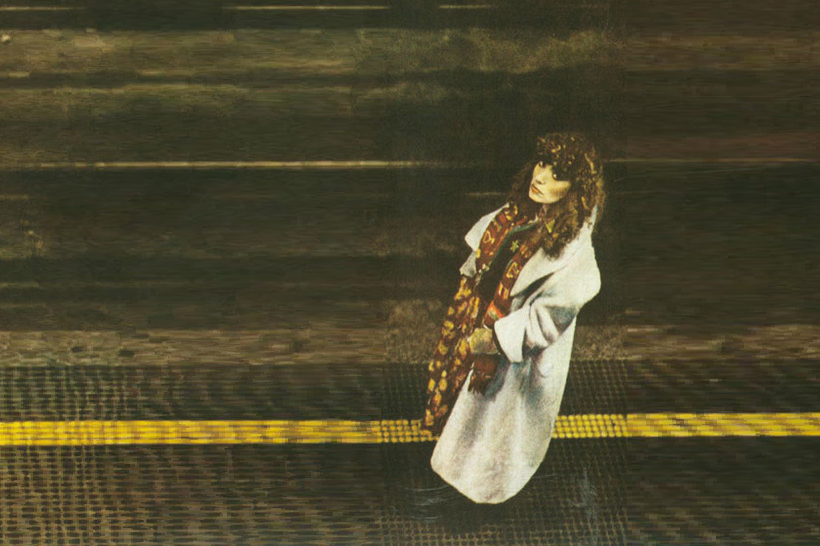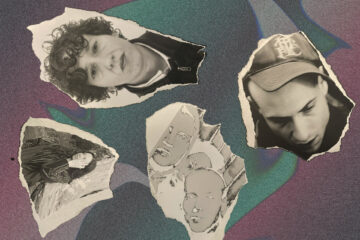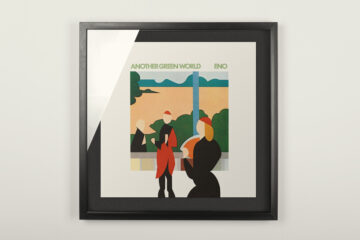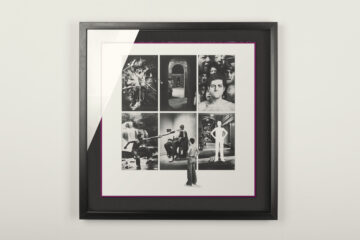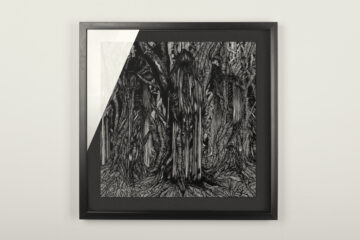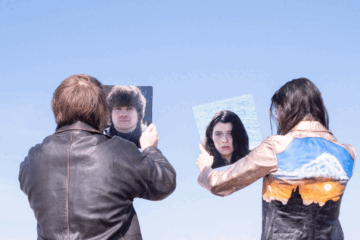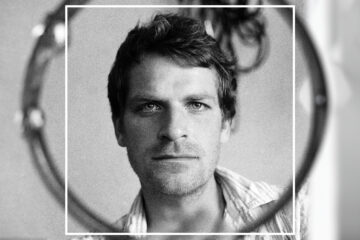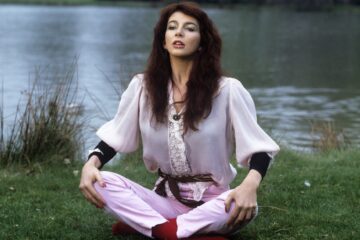Italian is one of the languages that knows the so-called absolute superlative, a grammatical phenomenon that regularly has translators scratch their heads. A song title like »Sei bellissima» by Loredana Bertè cannot simply be translated as »You are the most beautiful« or »You are more beautiful than all the others.« Instead, bumpy phrases have to be used: »very beautiful,« for example, or the slightly more elegant »most beautiful,« and so on. The problem is that unlike the conventional superlative, the absolute superlative does not imply any kind of comparison, which in turn means that a song title like this one refers a beauty that is somehow incomparable. It’s the kind of beauty that is also inherent in Bertè’s work. Although the singer never achieved the international cult status of cantautori such as Franco Battiato and Lucio Dalla or was able to score successes like the schmaltz rockers Eros Ramazzotti or Zucchero, she remains a unique figure in Italian music history to this day.
Bertè is born on 20 September 1950 in the province of Reggio Calabria. Together with her three sisters, she grows up in her grandmother’s house while her parents pursue their teaching profession elsewhere. The father is violent, the mother absent and unloving, and they divorce in 1962. Accordingly, young Loredana does not stay at home for long and at the age of only fifteen moves to Rome together with her sister Dominica, who is three years older to the day. It’s the only logical step for someone who, barely a decade later, will sing »meglio libera che stupida« (»better free than stupid«). The time there was the happiest of her life, she would later say.
Bertè had already started dancing at the age of twelve and continued in the capital. Not at the dance school, however, but on the stage of the Piper Club, a discotheque where the city’s beat scene rubs shoulders. These are however not only musically but also politically turbulent times. Sheaccompanied the year 1968 as a singer, Bertè later said, even though she »didn’t have a clue about politics,« as she would admit twenty years later in an interview on Swedish television. That however doesn’t mean that she and her performances didn’t become a political issue again and again. For Bertè, in keeping with the spirit of the times, makes the personal political. Despite her never explicitly referring to herself as a feminist in the course of her career, both her appearance and her songs will provide impulses for feminist discourse in Italy in the decades to come.
»That’s got nothing to do with morals«
At Piper, the teenager meets Renato »Zero« Fiacchini, who will become her long-time creative partner. Together they put on shows with dance, singing and acting while Bertè accompanies showgirl Rita Parvone on her tours around the world as part of her ensemble. During a stay in New York, she attends a performance of the musical »Hair« and is particularly impressed by the character Jeanie. Together with director and conductor Bill Conti, she herself performs in the Italian premiere of the musical and thus, via detours, also begins her career as a singer. Naturally, not without a solid scandal due to Jeanie’s naked scenes.
For a while Bertè helps out with the music of her sister Dominica, now known as Mia Martini, for, among other things, the single »Bolero,« while increasingly appearing in theatre pieces as a singer and also taking part in the performance of the first Italian rock opera, »Orfeo 9.« The film and television world is increasingly interested in her, and so is the Italian playboy. She takes every job she’s being offered, appearing in a series and films as well as on the cover of the magazine. The even bigger scandal for the aspiring artist, however, is called »Streaking,« her 1974 debut album.
It’s a record that lives up to its title: the album artwork features nude photography of Bertè. But the LP also goes beyond the purely visual level to confront the deeply Catholic and macho society she is confronted with. Bertè sings almost exclusively about sex and even swears explicitly, something that in these times is usually reserved for men. _»Voi dite sempre ‘non si fa’, no, no non è moralità« (»You always say: ‘You don’t do that’, but no, that’s got nothing to do with morality«) is how she pre-emptively counters the criticism in the song »Parlate di moralità« (»You talk about morality«), but it doesn’t help: the album is briefly taken off the market by the censors.
Pasta for Warhol
But Bertè wouldn’t be Bertè if she let that stop her. After »Streaking,« produced by Enrico Riccardi, had between proto-post-punk, stadium prog-rock and funk borrowings or blues-based classic rock put less focus on Bertè’s vocal qualities than her performance, »Sei bellissima« followed in 1975. The power ballad brought her not only critical acclaim but also her first major commercial success, though of course it again provoked censorship. The man sung about in the song tells her, of all places, in bed that she is worth little more than nothing. At first, the song, which today is considered a classic of Italian rock music, is therefore only available in a consored version. Torch songs have a long tradition in Italy, but references to sexual power structures are clearly not welcome.
»Sei bellissima« gives Bertè the opportunity to play out her greatest talent: to unite whispering sprechgesang and shrill screaming in one and the same melody. Even in the most pathetic ballads, a resistant spirit breaks through in her coarse voice. On her second album »Normale o super« in 1976, she first displays this talent to the fullest, accompanied by her then-partner, the songwriter and producer Mario Lavezzi. The two go on to work together for five albums in total. During this time, Bertè increasingly treads more differentiated musical paths: while the first albums still largely draw on the emotional and stylistic of rock music, she releases what is probably the first Italian mainstream reggae song with »E la luna bussò« (»And the moon knocked«) in 1979.
After celebrating her biggest hit to date with the single »Dedicato« – which also fell victim to censorship because of one line – she owed »E la luna bussò« to a visit to Jamaica, where she also saw Bob Marley live. The song is one of the few in her long career to attract attention outside Italy, but it does not turn Bertè into a full-blown reggae singer. Already on the album »LoredanaBertE’,« released in 1980, she turns to funk on tracks like »In alto mare,« records an album with the paradoxical title »Made in Italy« in New York and wins a famous contributor for the music video of the lead single: Andy Warhol contributed images to »Movie« after first being cooked pasta by Bertè and in return taking her to Studio54.
A Career in Descent, a World Full of Possibilities.
Bertè can hardly be stopped, as »Non sono una signora« (»I Am Not a Lady«) proves. Written by Ivano Fossati, like so many of her hit songs from this period, it is featured on the album »Traslocando« (»Moving On«), for which she receives her first platinum award. The follow-up »Jazz« tops this, but equally marks a definitive musical reorientation towards electronic pop – the title is anything but literal.
But the success does not last, and Bertè’s career slowly turns into the »volo a planare,« the gliding flight Bertè had sung about in »Non sono una signora.« However, this does not bother her, because after all, her past successes have opened up a world of creative possibilities for her. On the LP »Carioca« she appears for the first time – »for better or for worse,« as she later jokes – as a producer. Her music is increasingly influenced by Djavan, a representative of the Música Popular Brasileira whom she admires and whose repertoire she also reinterprets on »Carioca.«
However, more than a decade after her sensational debut, she is still less recognised for her musical work than for her provocative performances. At an edition of the Festival di Sanremo – the blueprint for the Eurovision Song Contest – she takes to the stage dressed as a pregnant woman. It is not the only one of her ten performances there that causes a stir: In 1997, for example, Bertè again has the first line of a song censored, »Luna«: »Vaffanculo luna!« (»Go fuck yourself, moon!«).
But it is neither the lack of commercial success nor the morality watch that causes Bertè to withdraw from the music world for a while at the end of the 1980s. She marries the former tennis player Björn Borg, who resolutely stands in the way of her career and for whom it is more important to shake hands with Osama bin Laden as a guest of George H. W. Bush in the White House than to keep to her tour schedule. Apart from a mixed Sanremo performance in 1991, she hardly performs live during the short marriage, releases no music and obviously suffers from the circumstances: in April 1991, she is taken to a Milan clinic after a suicide attempt, and barely a year later suffers a nervous breakdown.
A Heart Full of Darkness
But the woman who once sang the lines »meglio libera che stupida« leaves the control- and drug-addicted Borg behind, signs a record contract and goes back into the studio. Most importantly, after years of estrangement, she reconciles with Mia Martini again and performs the song »Stiamo come stiamo« (»We are, as if we were«) together with the sister in Sanremo in 1993. The lyrics, written by Bertè, who is now also active as a lyricist, are impressionistic and foreboding. »Stiamo come stiamo usati di seconda mano / Nel cuore un buio totale« (»We are like second-hand used / A heart full of darkness«). Bertè’s comeback seems ambivalent.
The time with her sister will also be short-lived. In 1994, Loredana had still drawn a vivid picture of her inner state on the song »Amici non ne ho« (»I have no friends«) with references to her own suicide attempt, and in the following year she has to accept the loss of her sister. Dominica dies on 14 May 1995. Her death has been preceded by physical complaints, but the autopsy reveals that the singer had died of a drug overdose. The suspicion of suicide is never completely dispelled. For Loredana, the death of her sister means a serious break: »For two years I locked myself up at home and stared at the ceiling.« But then she starts making music again because she has to, despite Dominica’s shadow perpetually hovering over it.
»The years went by and it was arduous and incomparably hard to do this job.«
Loredana Bertè
Since the 1990s, Bertè has remained active and productive. She delivered a career highlight in 2005 with the album »Babybertè,« repeatedly caused scandals at Sanremo because of, among other things, plagiarism, worked with Asia Argento, Ivana Spagna and Gigi D’Alessio and remained the great outsider of the Italian music world. Not always by choice, but mostly out of conviction. »I used to throw myself down, I jumped into the darkness,« she summed up her post-mid-1980s days in a 2010 interview for the TV show Mr. Fantasy. »The years went by and it was arduous and incomparably hard to do this job.« At times, she said, she simply did not enjoy singing. But more than that, she disliked the »provincial mentality« she had to put up with in the course of her career.
Nudity Is Fine, Dissent Is Not
From today’s perspective, all that hardly seems to matter any more, and not only because times have changed – but also because Bertè has changed them herself. The young woman who had no idea about politics in 1968 made some herself, whether with her lyrics or with her – pun intended – bare existence. At the age of 71, Bertè, who has since dyed her hair blue, is now back in the charts and has even been crowned »Regina del Rock italiano« (»Queen of Italian Rock«) by the public television station Rai Uno in a documentary, even if that falls short in musical terms alone.
When a year-long celebration of her musical output, accompanied by a comprehensive reissue campaign of her early work, was announced on 20 September 2020 under the awkward title »70th One Year Celebrating,« it finally provided an occasion to look back on a career after almost half a century in show business. Above all, it becomes clear how self-confidently to purposefully renitent Bertè reflected her own position as a woman in a world that perhaps resented her appearance and yet tried to censor her words. Nudity my be fine, dissent really is not.
And although Bertè may have started late to appear as a lyricist herself, there is a melancholy, sometimes even existential heaviness running through her songs – »buio,« »darkness,« is a word that appears in them just as often as the moon and the night have an appearance in them – that even in the moments when Bertè had approached the musical consensus of her time still stood beside it.
That is especially true in regards to her early work. Just as Bertè’s equally expressive and versatile singing could breathe a strange life of its own into even the most formulaic rock songs, she proved time and again that she had a flair for stylistically expanding the palette given to her and thus enriching the music world as a whole: reggae, funk, Brazilian music were purely marginal phenomena, at least in the Italian context, until Bertè took them on and created new forms based on them. To this day, they seem somehow incomparable.

